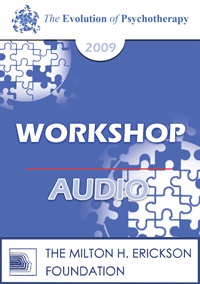
- Average Rating:
- Not yet rated
- Topic Areas:
- Workshops | Focusing | Psychotherapy
- Categories:
- Evolution of Psychotherapy | Evolution of Psychotherapy 2009
- Faculty:
- Eugene Gendlin, PhD
- Duration:
- 2 Hours 37 Minutes
- Format:
- Audio Only
- Original Program Date:
- Dec 10, 2009
- Short Description:
- Dr. Gendlin will work with volunteers from the audience to show how to find “Focusing.” The physically felt body sense ofa problem is at first unclear and gradually opens and becomes clear. There will be discussion and demonstrations to show how Focusing is used in the context of psychotherapy.
- Price:
- $15.00 - Base Price
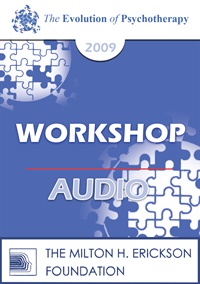
- Average Rating:
- Not yet rated
- Topic Areas:
- Couples Therapy | Workshops | Gottman Method | Relationships | Psychotherapy
- Categories:
- Evolution of Psychotherapy | Evolution of Psychotherapy 2009
- Faculty:
- John Gottman, PhD | Julie Gottman, PhD
- Duration:
- 1 Hour 51 Minutes
- Format:
- Audio Only
- Original Program Date:
- Dec 10, 2009
- Short Description:
- A systemic research-based approach to assessing and treating distressed couples will be presented. Multi-method assessments using questionnaires, interviews, observations, and physiological measurement will be reviewed. Key interventions based on the Gottman Sound Relationship House Theory will be described, and video segments of in-office therapy sessions will be shown to demonstrate them.
- Price:
- $15.00 - Base Price
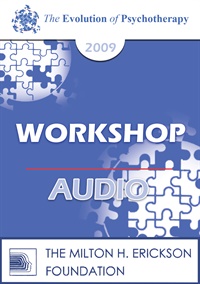
- Average Rating:
- Not yet rated
- Topic Areas:
- Workshops | Anger | Cognitive Behavior Therapy (CBT) | Psychotherapy | Treatment Planning
- Categories:
- Evolution of Psychotherapy | Evolution of Psychotherapy 2009
- Faculty:
- Donald Meichenbaum, PhD
- Duration:
- 2 Hours 44 Minutes
- Format:
- Audio Only
- Original Program Date:
- Dec 10, 2009
- Short Description:
- Dr. Meichenbaum will trace how aggressive behavior develops, and consider both the treatment and preventive implications.He will use video training films to demonstrate how to conduct cognitive-behavioral Stress Inoculation Training with angry and aggressive individuals. He will consider how to incorporate generalization guidelines into any training program.
- Price:
- $15.00 - Base Price
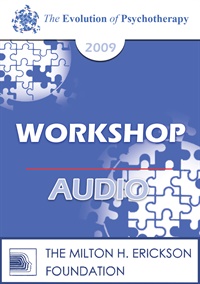
- Average Rating:
- Not yet rated
- Topic Areas:
- Couples Therapy | Workshops | Domestic Violence | Group Therapy | Psychotherapy
- Categories:
- Evolution of Psychotherapy | Evolution of Psychotherapy 2009
- Faculty:
- John Gottman, PhD | Julie Gottman, PhD
- Duration:
- 1 Hour 56 Minutes
- Format:
- Audio Only
- Original Program Date:
- Dec 10, 2009
- Short Description:
- This workshop describes a 22-session couples’ group intervention and curriculum for lower and middle-class couples. Each session begins with a talk-show video showing discussions with couples in poverty on curriculum topics, e.g.’ healing from infidelity, avoiding and healing from domestic violence, etc. The video is followed by group discussion, a brief teaching,and an exercise that focuses on learning new skills. Throughout most of the curriculum,, physiological soothing is taught through biofeedback. Details of the curriculum and video samples will be shown.
- Price:
- $15.00 - Base Price
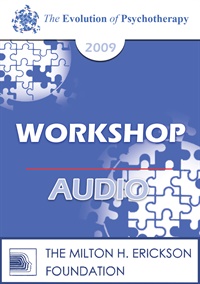
- Average Rating:
- Not yet rated
- Topic Areas:
- Workshops | Dreamwork | Focusing | Meditation, Spirituality and Yoga | Psychotherapy
- Categories:
- Evolution of Psychotherapy | Evolution of Psychotherapy 2009
- Faculty:
- Eugene Gendlin, PhD
- Duration:
- 2 Hours 17 Minutes
- Format:
- Audio Only
- Original Program Date:
- Dec 10, 2009
- Short Description:
- In this experiential workshop, volunteers will be asked to describe a dream in detail and then to work on it with Dr. Gendlin. It is not necessary to tell everything; private space and silent meditation are essential. The use of Focusing will be demonstrated.
- Price:
- $15.00 - Base Price
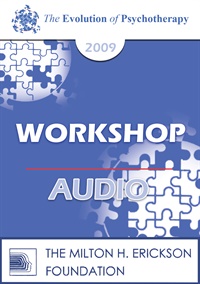
- Average Rating:
- Not yet rated
- Topic Areas:
- Psychotherapy | Workshops | Multicultural
- Categories:
- Evolution of Psychotherapy | Evolution of Psychotherapy 2009
- Faculty:
- Derald Wing Sue, PhD
- Duration:
- 2 Hours 37 Minutes
- Format:
- Audio Only
- Original Program Date:
- Dec 10, 2009
- Short Description:
- What is multicultural counseling/therapy? How applicable are our standards of clinical practice for racial/ethnic minority populations? Are there differences in therapy between white and clients of color? This workshop will present the theory, practice and assumptions of MCT via lecturettes, case vignettes and brief video samples. Culture specific and culture universal approaches will be presented.
- Price:
- $15.00 - Base Price
Tags: Multi-Cultural Psychotherapy
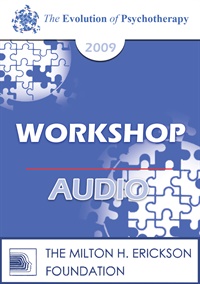
- Average Rating:
- Not yet rated
- Topic Areas:
- Workshops | Borderline | Psychotherapy | Transference Focused Psychotherapy (TFP)
- Categories:
- Evolution of Psychotherapy | Evolution of Psychotherapy 2009
- Faculty:
- Otto Kernberg, MD
- Duration:
- 2 Hours 27 Minutes
- Format:
- Audio Only
- Original Program Date:
- Dec 10, 2009
- Short Description:
- This workshop will focus on the complications in psychodynamic treatment with Transference Focused Psychotherapy. It will explore the management of suicidal and parasuicidal behavior, disruptive of the treatment, severe acting out in and outside the sessions, dishonesty, severe affect storms, and primitive forms of aggression. The treatment of trauma, paranoid regression, erotization, and secondary gain will complement this workshop.
- Price:
- $15.00 - Base Price
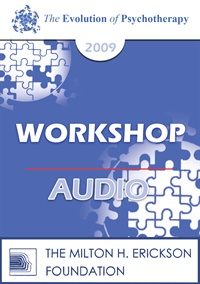
- Average Rating:
- Not yet rated
- Topic Areas:
- Psychotherapy | Workshops | Art and Creativity | Experiential Therapy | Therapist Development
- Categories:
- Evolution of Psychotherapy | Evolution of Psychotherapy 2009
- Faculty:
- Jeffrey Zeig, PhD
- Duration:
- 1 Hour 51 Minutes
- Format:
- Audio Only
- Original Program Date:
- Dec 10, 2009
- Short Description:
- Experiential methods enliven therapy through dynamic experiences that promote dynamic realizations. We will explore methods that make therapy a visual art, recognizing the visual realizations are neurologically encoded more robustly than words, hence more easily accessed when needed. We will explore the use of gestures, objects, and even sounds to empower change. We will learn the latest advances in therapist sculpting. Lecture, demonstration, and small group exercises will be used
- Price:
- $15.00 - Base Price

- Average Rating:
- Not yet rated
- Topic Areas:
- Meditation, Spirituality and Yoga | Workshops | Dreamwork | Genomics | Neuroscience | Psychotherapy
- Categories:
- Evolution of Psychotherapy | Evolution of Psychotherapy 2009
- Faculty:
- Ernest Rossi, PhD
- Duration:
- 2 Hours 44 Minutes
- Format:
- Audio Only
- Original Program Date:
- Dec 12, 2009
- Short Description:
- Revolutionary research in neuroscience and functional genomics documents show how experiences of novelty, environmental enrichment, and exercise (both mental and physical) can optimize gene expression, brain plasticity, healing and life extension in dreams, meditation and spiritual rituals. In this workshop, we will experience the four-stage creative cycle in ourselves and in others.
- Price:
- $15.00 - Base Price
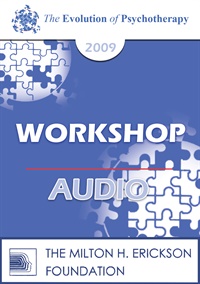
- Average Rating:
- Not yet rated
- Topic Areas:
- Trauma | Workshops | Psychotherapy
- Categories:
- Evolution of Psychotherapy | Evolution of Psychotherapy 2009
- Faculty:
- Bessel van der Kolk, MD
- Duration:
- 2 Hours 18 Minutes
- Format:
- Audio Only
- Original Program Date:
- Dec 12, 2009
- Short Description:
- The study of psychological trauma has been accompanied by an explosion of knowledge about how experience shapes the central nervous system and the formation of the self. We have learned that most experience is automatically processed on a subcortical level, i.e. by “unconscious” interpretations that take place outside of awareness. Insight and understanding have only a limited influence on the operation of theses subcortical processes. When addressing the problems of traumatized people who, in a myriad of ways, continue to react to current experience as a replay of the past, there is a need for therapeutic methods that do not depend exclusively on understanding and cognition. This workshop surveys current research on how people’s brains, minds and bodies respond to traumatic experiences, and will specifically address the use of affect modulation techniques, EMDR, yoga, theater, and neuro feedback in overcoming various aspects of the destabilization and disintegration caused by trauma.
- Price:
- $15.00 - Base Price
Please wait ...

